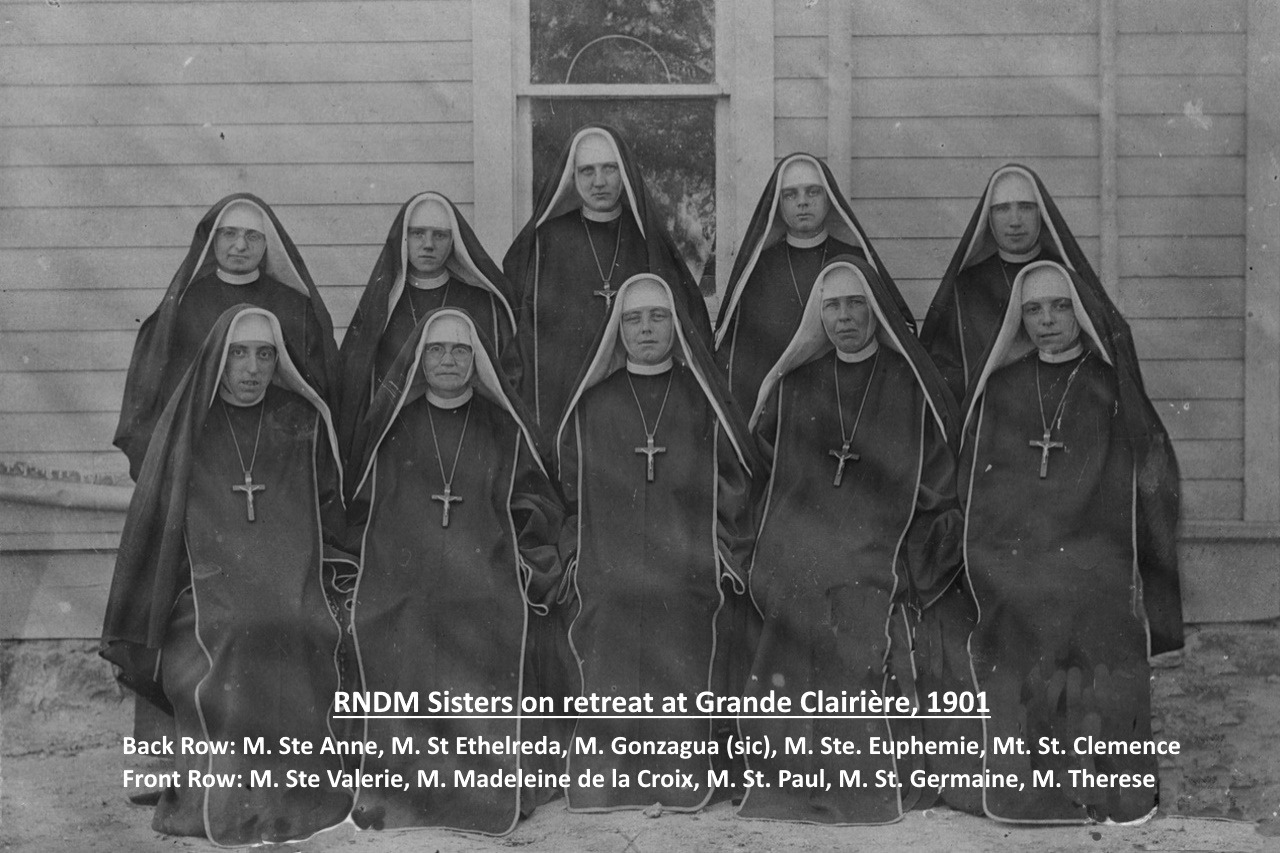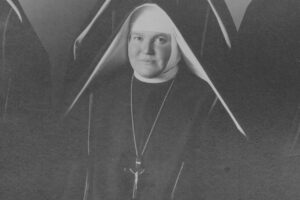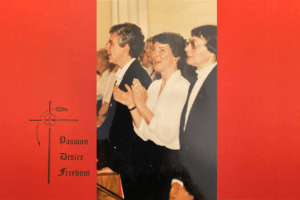We have decided to honor this 125th anniversary of the RNDMs arrival in Canada by posting a monthly history excerpt. These monthly posts will seek to pass on a sense of who these women were, the great hope with which they came to Canada 125 years ago. The parts of the history we will be citing will be from the account written by Mother Marie de la Ste Trinité. She was not one of the first women to come, but her written record set down to mark the 25th anniversary of the Sisters’ arrival, has become a principal source of information about the first Sisters who came to Canada.1
This month’s account begins with the arrival from France, of the four founding Sisters’ – first in St. Boniface, and their subsequent arrival in Grande Clairière. Sr. M. St. Paul, Sr. M. de l’Eucharistie, Sr. M. St. Valerie, and Sr. M. Madeleine de la Croix were graciously received in St. Boniface by:
… the sisters of Charity of Montreal, commonly known as Grey Nuns, (were) asked to give us hospitality – a request readily granted. Truly, we received from them a most sisterly welcome. Sister de L’espérance, who is looking after our needs, did all she could to please us. Since she wanted to introduce us to local usages and customs, she showed us all the modern commodities with which the vicariate house, and its dependencies refurnished.
We spent the next day, Tuesday, visiting the principal buildings of Saint Boniface, the “Rome of the Canadian West”. There were the girls’ orphanage, the old folks, home, the magnificent hospital, directed by their community, the Industrial school for Indian boys, and girls, and a large Jesuit college. Everything in all these flourishing and well organized, Catholic institutions interested us. Because of our total ignorance of the conditions which existed in the centre of this country where we, too, were to settle, everything we learned, became very useful as it was, in this humble sphere that we were to begin the work of God.
The next day, we were again on the train, this time, for the last stage of our journey. Leisurely, we admired the magnificent, fully ripened wheat fields along the way. This sight of abundance singularly contrasted with our personal position, for not having any food, we were forced to fast the whole day, which then seemed quite long. About 8:00 PM the train dropped us off at Findlay, a small village about five miles north of Grand Clairière. … Since the pastor had not announced our arrival, nobody was expecting us. He, therefore, had to walk several miles to find vehicles and men to take us and our luggage which had been thrown pell-mell on the station platform, since there is no agent at this unimportant station. …
About 11:30 PM, Mr. Quenelle, one of our drivers, invited us to stop at his home. His wife offered us a splendid supper, prepared in a hurry. We gladly accepted it, because we had had no food since morning; however we had to hurry; it was near midnight, and we wanted to receive communion in the morning.
We were soon on our way again, two of us in the light carriage, called a ‘buggy’, and the others perched on the irregular pile of cases packed in a large wagon. The road was rough and the heavy vehicle was continually being jolted. Poor Mother, M. Madeline of the Cross was in constant fear; she, who dreaded heights, was seated on the top of the luggage. Moreover, at every jolt, she had to support Father Gaire to prevent him from being thrown out. He had on his knee, a small cask of wine, and there was nothing he could grasp. However, the ride was amusing, though at dead of night, and after the many hardships of the day.
Could we not call this our triumphal entry? No conqueror experienced more satisfaction then our little group when on August 11 at 1 AM we at last arrived at the post assigned to us by holy obedience, i.e. In front of the poor rectory of Grande Clairière. Although there was no one there, the door was open, left by some unknown stranger. Everyone knew that this charitable priest had the habit of receiving and lodging any passerby in search of shelter. Visitors made themselves at home in his absence, as well as when he was home, for the locks had never known any key.
The house was the picture of the most complete destitution. Even those things that were considered indispensable in the homes of the needy were lacking. Instinctively, each of us compared it “in petto” to the stable of Bethlehem. Even the straw was there, for in the three so-called rooms or nooks on the first floor, where we were to sleep, the beds consisted of four planks nailed to the wall and covered with a rough straw mattress. However, we were given clean sheets to replace those that showed traces of frequent use. As for the pastor, after having given us his dwelling, he took his fur coat in lieu of a bed, and went to the upper story of the school.2
Veronica Dunne is a Sister of our Lady of the Missions (RNDM), who has primarily worked as an educator and counsellor in institutional and community based settings in Canada. She has also served with the RNDMs outside of Canada in Senegal, Peru, and Aotearoa New Zealand.
A 2002 Doctor of Ministry graduate from the University of St. Michael’s College, Toronto School of Theology at the University of Toronto, she subsequently served as director of the Doctor of Ministry program at St. Stephen’s College at the University of Alberta in Edmonton. Her current research interests are in eco-theology and cosmology, and their intersections with indigenous cosmologies and spiritualties.
She presently serves on the RNDM leadership team in Canada.





Thanks for your well written account of your first sisters coming to Canada: Brave, strong, funny, hopeful, loveable and faith filled.
Very interesting. I admire your Sisters How dedicated and faith filled were these women. Thank you for sharing this with us. We were privileged to welcome you.